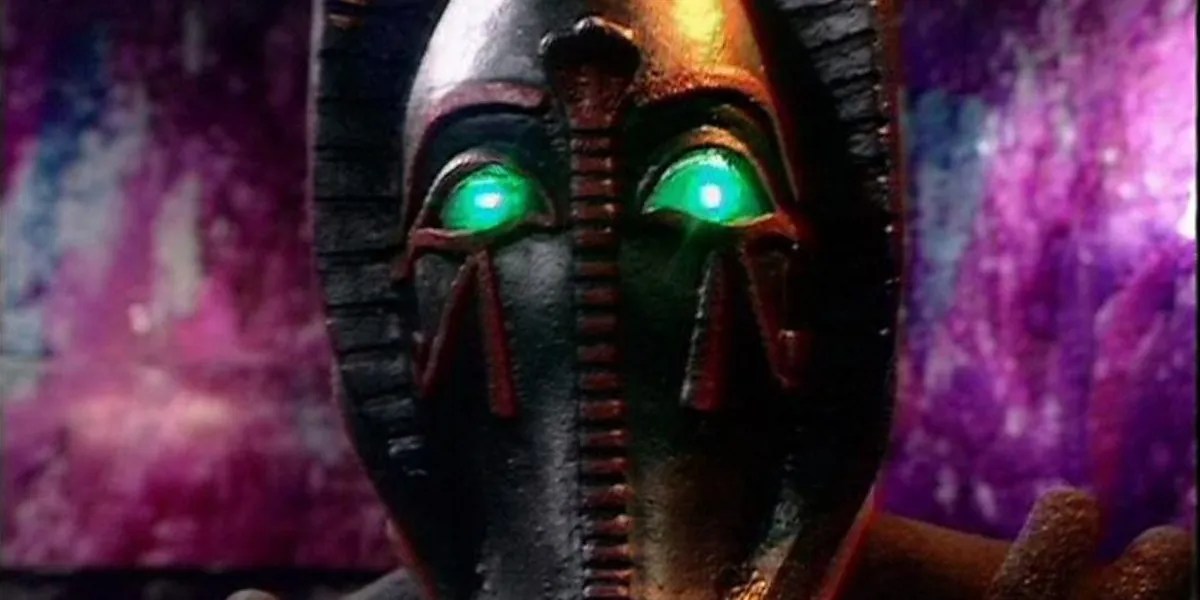Doctor Whohas 61 years of history on the small screen. It has almost 900 episodes, with almost 100 lost to time. Most of its stories are episodic adventures that open and close with the iconic title sequence, leaving little long-term impact on the series. The ongoing 14th series currently running on BBC and Disney+ recently resurrected an antagonist that hasn’t appeared in almost 50 years. Sutekh stepped out of Egyptian mythology and into the beloved sci-fi series.
One of the fun aspects ofDoctor Whois its freedom topull from just about any source. The ideal episode places the Doctor and his companions in a sci-fi situation that could have supported a full-length feature film. Countless examples seem reminiscent of existing scripts, while many others may have inspired new projects. Sometimes,Doctor Whowriters borrow from mythology, fantasy, or classic literature to spice up their menagerie.

Who and what is Sutekh?
Sutekh,often known as Set, is an Egyptian god known for commanding storms, violence, the desert, and disorder. His presence inDoctor Whomirrors his role in mythology, at least to a point. Sutekh is a member of an all-powerful alien species called the Osirians, organized into a governing body called the Osirian Council. The Osirians' unique appearances and divine abilities push many cultures, including the Egyptians of Earth, to worship them as gods. Sutekh is the son of Geb and Nut, the earth and the sky. He grew to become one of the species' mightiest warriors. In both stories, Sutekh guarded Ra, the sun, from the serpent of chaos. Unlike in mythology, the Time Lord Great Houses released those snakes to kill the sun. The Osirians made war againstthe Great Houses for ages, until Sutekh unleashed an army of vampires into the Mediterranean. This concluded the initial conflict between the species, but it also ignited Sutekh’s rage against his own.
Doctor Whocovers its version of Sutekh and Horus inaudio dramas and novels. Sutekh believed that the Osirian Court owed him everything. That entitlement should have given Sutekh the throne, but his brother Osiris’s accomplishments seemed to impress the species. Sutekh killed Osiris, but he reincarnated as Horus and sought revenge. To face Horus, Sutekh mastered the desert and partnered with the Kotturuh, a mighty alien race that could somehow impose a defined lifespan on any being. Sutekh declared a time war against Horus, fighting his nephew through various points in history. He also found the time to sew chaos across the galaxy. During this campaign, some came to know him as Satan, which is also true of many other beings. Sutekh’s wife tricked him into believing he’d killed Horus, eventually leading to Horus attacking with an army of fellow Osirians. They imprisonSutekh in a pyramidon Earth, suppressing his power with a gem on Mars.

“Pyramids of Mars”
Robert Holmes and Lewis Greifer
Release Date
June 16, 2025
Sutekh first entered the TV series in “Pyramids of Mars,” the third serial of the thirteenth season. It’s a four-part entry that’s about 100 minutes in total. “Pyramids of Mars” followsTom Baker’s Fourth Doctorand Elisabeth Sladen’s Sarah Jane Smith through a Gothic horror adventure. Sutekh remains entombed in the pyramid, but an archaeologist named Marcus Scarman unearths the sleeping beast. Sutekh seizes Scarman’s mind and forces him to work to free him. The power draws the TARDIS out of its flight path, leaving the Doctor and Sarah on Scarman’s estate in 1911. They must contend with robots that look like mummies as they discover Sutekh’s involvement in the plot. Sutekh wants to construct an Osirian missile to destroy his prison and set him free. The Doctor enacts several schemes, eventually destroying the missile before Sutekh can launch it. Sutekh still manages to compel Scarman to destroy the gem holding him in place, but the Doctor manages to use part of the TARDIS to delay that effect beyond Sutekh’s lifespan.
Why is Sutekh back inDoctor Who?
Sutekh is the surprise villain that all ofDoctor Whoseries 14(also known as season one) has led up to. Several characters have made enigmatic references to “The One Who Waits,” leading many fans to speculate. In “The Ballad of Ruby Sunday,” Sutekh revealed himself in the flesh to claim his spot as the new final boss. He joins several returning antagonists, many of whom also existed exclusively in a single classic episode. Sutekh emerged through his new servant, Susan Triad, who tricked the Doctor into believing she might be his granddaughter. The ruse ended with a face-to-face meetup in the final moments of the penultimate episode.
“Empire of Death” has not hit the airwaves at the time of writing, but fans can be sure that it will shed further light onthe returning Egyptian god. Sutekh is a fascinating antagonist. His motivations can be a bit one-note, but there’s always something appealing about watching the Doctor work to outwit a god. Sutekh appears in several novels, comics, and audio dramas for any dedicated fans who’d like to see more of him. Sutekh will finalize his grand return toDoctor Whoin the series fourteen finale.